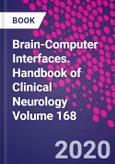Brain-Computer Interfacing, Volume 168, not only gives readers a clear understanding of what BCI science is currently offering, but also describes future expectations for restoring lost brain function in patients. In-depth technological chapters are aimed at those interested in BCI technologies and the nature of brain signals, while more comprehensive summaries are provided in the more applied chapters. Readers will be able to grasp BCI concepts, understand what needs the technologies can meet, and provide an informed opinion on BCI science.
Please Note: This is an On Demand product, delivery may take up to 11 working days after payment has been received.
Table of Contents
1. Human brain function and brain-computer interfaces2. Brain-computer interfaces: definitions and principles
3. Stroke and potential benefits of brain to computer interface
4. Brain-computer interfaces for people with amyotrophic lateral sclerosis
5. Brain damage by trauma
6. Spinal cord lesions
7. Brain:computer interfaces for communication
8. Applications of brain-computer interfaces to the control of robotic and prosthetic arms
9. BCI for rehab ('not control')
10. Video games as rich environments to foster brain plasticity
11. Consciousness and communication brain-computer interfaces in severely brain-injured patients
12. Smart neuromodulation in movement disorders
13. Bidirectional brain computer interfaces
14. Brain-computer interfaces and virtual reality for neurorehabilitation
15. Monitoring performance of professional and occupational operators
16. Self-Health Monitoring and wearable neurotechnologies
17. Brain-computer interfaces for basic neuroscience
18. Electroencephalography
19. iEEG: dura-lining electrodes
20. Local field potentials for BCI control
21. Real-time fMRI for brain-computer interfacing
22. Merging brain-computer interface and functional electrical stimulation technologies for movement restoration
23. General principles of machine learning for brain-computer interfacing
24. Ethics and the emergence of brain-computer interface medicine
25. Industrial perspectives on brain-computer interface technology
26. Hearing the needs of clinical users








